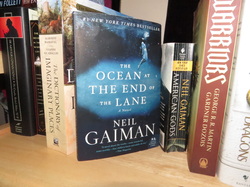 CONTAINS A FEW SPOILERS WHINERS BEWARE An ocean can be carried in a bucket. A father trying to drown his son was edited out of reality. Monsters are monsters because they’re scared. People shouldn't always have what they want. You don’t pass or fail at being a person. These are things that stuck with me when I finished Neil Gaiman’s “The Ocean at the End of the Lane.” Having been the second book I’ve read by Gaiman, ( I finished “American Gods” last week) my desire to read the rest of his work has reached extreme levels. In “Ocean,” Gaiman uses all of my favorite story telling elements--mythology, questioning humanity, a possibly unreliable narrator, ambiguity, and magic. The prolepsis (flash forward) scene at the beginning shows the unnamed narrator driving from a funeral (we never learn who died) and returning to the Hempstock farm, run by the three Hempstock women. He sits by the ocean that isn’t an ocean and remembers. I didn’t realize until I read Gaiman’s interview at the end of the book, that three of the main characters, and the only ones that are named, are based of the Maiden, the Mother, and the Crone. Each had a distinct personality that were all very well written. The youngest, Lettie Hempstock, makes an impression on the narrator that draws him to their farm very often. When I read the summery, I expected a childhood love story, full of unrequited love standing the test of time that would make me want to puke. Thankfully, I did not want to puke at any time reading this book. The narrator is thrust into a small part of the Hempstock’s world, full of magic, a pond/ocean, and evil spirits, one of which enters the world through the narrator. That evil spirit becomes his awful nanny, intent on giving people what they want even if it kills them (which it does). Lettie saves the narrator from this monstrosity, but opens the door to something much more dangerous. This book’s story is completely magical and wonderful. However much I love the point of view and prolepsis, I wanted to read more about the Hempstock women and why men don’t stick around, and how you dissolve shadows in vinegar. With every question Gaiman answered, five more came about. Why doesn’t the narrator remember the first time he returned to the farm? Will he ever? Will Lettie be the same? Does the narrator pass Lettie’s inspection? Where do the varmints come from? And most importantly, how do you dissolve shadows in vinegar? Through all the questions, my guess on the purpose of the book is this: The kind of person you are depends on self-awareness, the people you trust, ability to accept another’s reality, and your actions when varmints are eating your reality. Also, you don’t pass or fail at being a human. I give this book four and half stars out of five, and highly recommend it to any dreamers, readers, magical beings, and any evil nannies lurking about.
0 Comments
|
Archives
March 2017
Categories
All
|
 RSS Feed
RSS Feed